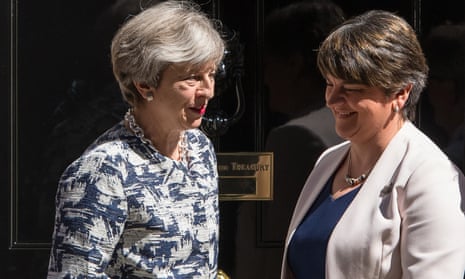Parliament will need to approve the release of £1bn in funding for Northern Ireland promised to the Democratic Unionist party by Theresa May to secure its support after the general election, the government has conceded.
Challenged by the campaigner Gina Miller about the legal basis for releasing the funds, which have not yet been made available, the Treasury solicitor, who heads the Government Legal Department, said it “will have appropriate parliamentary authorisation”, adding: “No timetable has been set for the making of such payments.”
Replying to a legal letter from Miller and the Independent Workers Union of Great Britain (IWGB), Jonathan Jones said the government intends to use “long-established procedures, under which central government requests the grant of money by the House of Commons” in order to pay out the funds it promised the DUP in the controversial agreement in June.
Miller, who won a supreme court challenge against the government earlier this year, forcing it to hold a parliamentary vote before triggering the formal Brexit vote, said May should have made clear from the outset that a vote in parliament would be necessary.
“It beggars belief that, neither at the time the government sealed its dubious deal with the DUP in exchange for their votes in the Commons, nor at any point since, has the government made it clear that the £1bn of taxpayers’ money for Northern Ireland could only be handed over following parliamentary approval.”
Dr Jason Moyer-Lee, general secretary of the IWGB, said: “Many IWGB members’ jobs depend on public money, like foster care workers and low-paid outsourced university staff. They are routinely told that there’s no money available to improve their pay, holidays and other terms and conditions they demand.
“Yet when it comes to keeping themselves in power, this government’s fiscal discipline quickly dissipates. There’s undoubtedly a need for increased social spending throughout the UK but this should be on a basis of fairness; not self-serving party politics.”
The Conservatives’ decision to strike a “confidence and supply” agreement with the socially conservative DUP in order to secure the votes of its 10 MPs for key pieces of legislation caused consternation among some Tory backbenchers.
Jeremy Corbyn used the DUP deal against May at prime minister’s questions last week. When she accused him of “consistently [asking] for more money to be spent on this, that and the other,” Corbyn replied: “The prime minister had no problems finding £1bn to please the DUP.”
Even hardened Tory rebels would be unlikely to vote against a measure necessary for the survival of their government; but any parliamentary debate about the extra funding required would allow Labour to exploit the government’s embarrassment.
In the letter to Miller, the government also rejects the idea that the Barnett formula, which determines the knock-on effect for the devolved nations and regions of core government spending in England, should affect the DUP funding.
“The government is not under a legal obligation to allocate funding to the devolved administrations only in accordance with the Barnett formula,” it says. “The Barnett formula is a non-binding convention and it does not preclude other means of additional funding being made available.”
Separately, the DUP deal is being challenged in a crowdfunded legal case by Green party activist Ciaran McClean that claims it breaks the promise of impartiality in the Good Friday agreement and breaches the Bribery Act.
The high court notified both sides’ legal teams on Friday that because of the urgency of the claim it should be heard in October at the beginning of the new legal term. It is likely to begin on 26 October.









